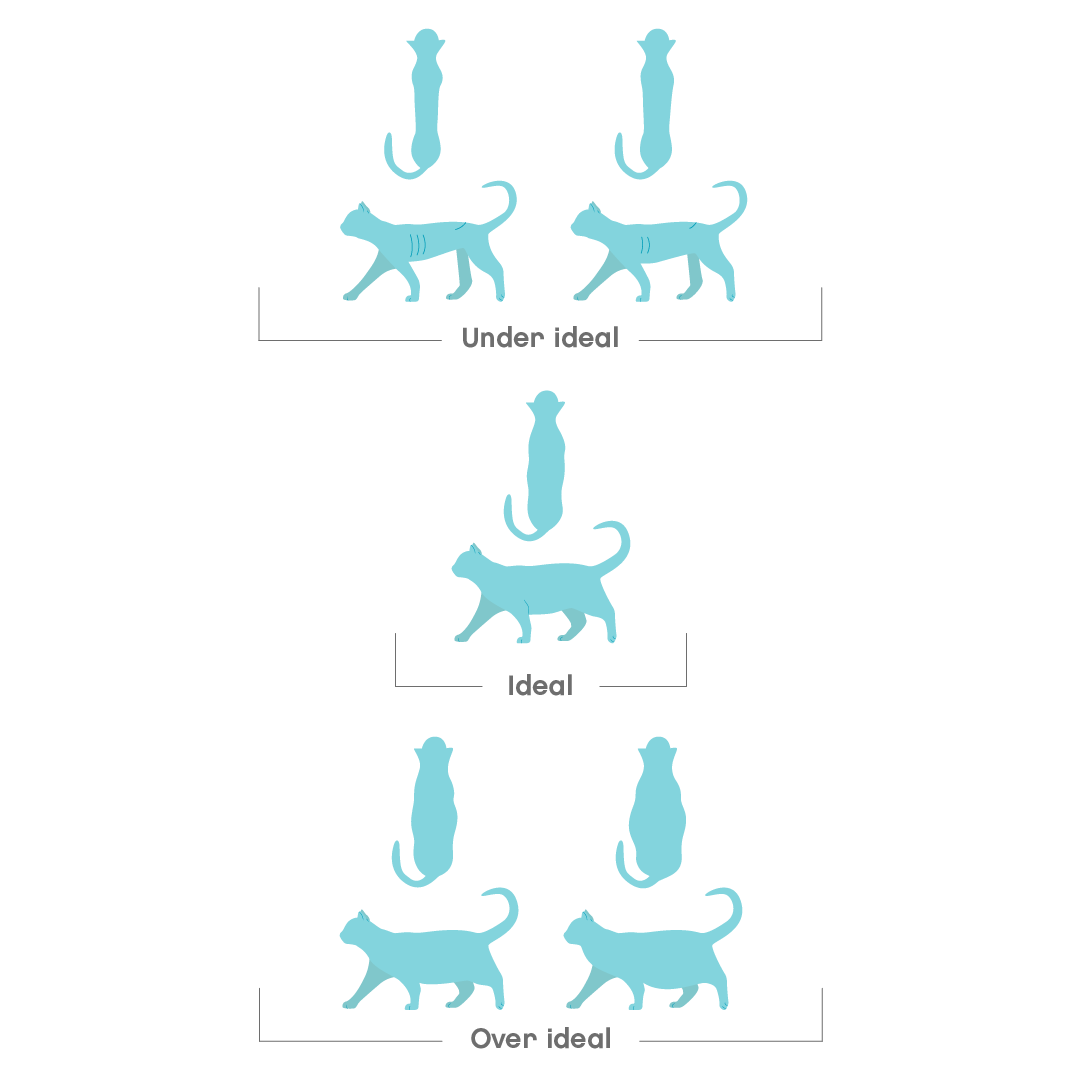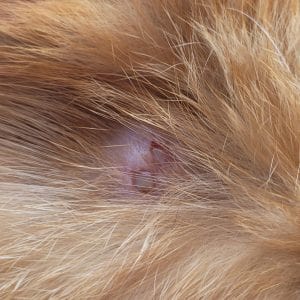An abscess in cats is an area of pus caused by a localised bacterial infection. Abscesses can develop in different parts of the body and affect cats of any age.
There are many different causes of abscesses. The most common types of abscesses are easy and quick to treat. There are less common types (mostly internal) that can be life-threatening if not treated quickly. Abscesses are painful for cats, we always recommend speaking to a veterinarian to discuss the best treatment.
What to do
What to do if your cat has an abscess
If your cat has an abscess, we recommend speaking to a vet as soon as possible. Abscesses cause pain and usually require specific medication.
While waiting for an appointment, you can
- Use a warm compress on the area to help relieve discomfort
- Clean any discharge with cooled, boiled water if possible to remove excess crust
- Use a buster collar or pet medical suit to prevent any self-trauma to the affected area
- Let your cat rest in a quiet and comfortable area
- Make sure they are eating and drinking
Be careful if you try to clean the area or apply a warm compress. Your cat may become aggressive if they are in pain. If they show any sign of this, then it is best to leave the area alone and get a vet appointment as soon as possible.
Abscesses can worsen if not treated promptly. Our Joii team are available 24 hours a day for advice. Call us now if you have any concerns.
Causes
Common causes of abscesses in cats
- Cat bite abscess
- Other skin abscess: due to foreign material, such as grass seeds or sticks, or due to bite Wounds from other animals
- Tooth root (dental) abscess leads to Bad breath
- Anal gland abscess
- Tumours leading to secondary infection
When to worry
When you should be worried about abscesses in cats
Seek help from a vet if
- Your cat is in Pain
- Your cat has not been eating or drinking for more than 24 hours
- Your cat has problems breathing
Call us and speak to one of our Joii Vets
- For advice about how to keep your cat’s mouth healthy
- For advice about how to help prevent anal gland disease
- If you have any questions about neutering your cat
- If your cat has been bitten by another animal
Prevention
Tips on how to prevent your cat from getting abscesses
Unfortunately, not all abscesses are preventable; however, there are measures that can reduce the chances of certain types.
- Speak to a vet as soon as possible if your cat has been bitten or scratched by another animal. Thorough cleaning as early as possible is important
- Where possible, prevent your cat from accessing areas where there are grass seeds
- Check your cat over when they come home from being outdoors and remove any grass seeds or foreign objects from their coat.
- Get your cat’s teeth checked at least every 6 months with your vet
- Keep your cat’s teeth clean by brushing them with a cat friendly toothpaste and using a special dental food
- If your cat has anal gland issues, use fibre supplements and get them checked or emptied when needed
- Getting your male cat neutered can reduce roaming and fighting
- Keep your cat in healthy body condition
Body Condition Score (BCS) is a scale that gives a practical evaluation of the fat coverage of your cat’s body. By checking how easy or not it is to feel certain bony areas of the body, a score is then produced. There are several scales, from 1 to 5 or 1 to 9. The ideal body condition lies in the middle, so either 3/5 or 5/9. The body areas normally checked for fat coverage are: 1. ribs and spine 2. hips and shoulders 3. waist Here are a few tips on how to do it. With your pet in a standing position:
Body Condition Scoring (BCS) in cats

Our Joii team are available 24 hours a day if you have any questions about preventing abscesses in cats.
Diagnosis
How to know if your cat has an abscess
The symptoms of any abscess depend on where it is located
- The most common signs are heat, swelling, and pain in the area
- Your cat may try to constantly lick or bite the abscess area
- The abscess may rupture and produce a smelly discharge of pus and blood.
- Cats with an abscess may also have a fever, which can cause a reduced appetite and low energy
- Limping is a common sign if the abscess involves a limb
Cat bite abscess
- Puncture wounds are sometimes seen
- Swelling and then an open wound with a bloody discharge
- Hair loss and excessive cleaning

- Cat bite abscesses can appear anywhere on the body
Anal gland abscess signs
- Pain and swelling around the anus
- Scooting and rubbing their bottom on the ground
- Excessive biting and hair loss around the bottom or back legs
- Straining to pass stools

- Anal gland abscesses appear below the tail
Tooth root abscess signs
- Smelly breath and chewing on one side
- Drooling
- Weight loss
- Swelling on the face, usually below the eye
- Pawing at their face or rubbing it on the floor

- Tooth abscesses often appear as a swelling on the face
Home treatment
How to treat abscesses in cats at home
Unfortunately, most abscesses will require a physical exam and prescription medication for treatment.
Once your cat is on the appropriate medication, you can:
- Make sure to give the medication as often as advised; do not skip doses or finish the course early
- Give your cat a quiet and comfortable place to rest in the house. Keeping indoors during treatment is usually advised, especially if surgery is involved
- Ensure your cat is eating well; soft food or a highly palatable diet may be needed for certain conditions
- Monitor your cat closely; if the swelling or pus are not disappearing, then other medication may be needed
- Abscesses do not normally spread to other areas of the body or other pets
Vet treatment
Vet treatment for abscesses in cats
Treatment of an abscess will depend on where it is located and the cause.
- Most abscesses will require antibiotics and anti-inflammatory pain relief medication
- Most will also need thorough cleaning and flushing. Removal of any foreign material (such as pieces of nail or grass seeds). If the abscess has not already ruptured, it will need to be lanced (cut-open).
- Others may require more specific surgery, such as tooth removal or removal of a tumour.
- Sedation or anaesthesia is needed for all of these procedures
After a full clinical exam, the following tests may be required
- Analysis of a sample of the discharge from the abscess
- Blood and urine tests to check for underlying disease
- Imaging: x-rays, ultrasound, CT or MRI, depending on where the abscess is located
Risk
Are some cats at more risk of abscesses than others?
- Un-neutered male cats are more prone to cat bite abscesses
- Older cats, flat faced breeds (such as Persians) and cats with poor quality diets are at higher risk of dental disease and a tooth abscess
- Cats with diarrhoea, allergies, and poor diets are more likely to develop an anal gland abscess.
- Cats with FIV and FeLV have a reduced immune response due to their compromised immune systems. They can be more prone to abscesses. Cats with diabetes or those on immunosuppressive medication have a similar risk.
Other causes of abscesses in cats
- Liver abscesses in cats are rare. Usually caused by a bacterial infection in the blood. Symptoms include lethargy, fever, reduced appetite, and vomiting.
- Lung abscesses in cats are very rare. They are usually caused by severe pneumonia, trauma, or an inhaled foreign object. Symptoms include reduced appetite, coughing, lethargy, and fever.
- Brain abscesses are rare in cats. Causes include inner ear infections or trauma. Symptoms include fever, seizures, and behavioural changes.
- Pancreatic abscesses in cats are due to long term gastrointestinal disease, or pancreatitis. These are not common. Symptoms include vomiting, loss of appetite and lethargy.
- Post-surgical reactions are abscesses that form at the site of incision. Risks include longer operations, moist wounds (i.e. due to licking), and wounds that are not clipped and cleaned properly. Symptoms include pus, pain, and swelling.








